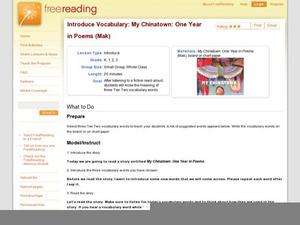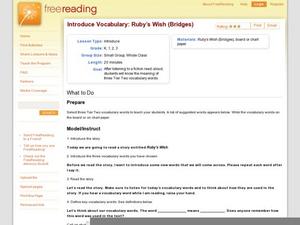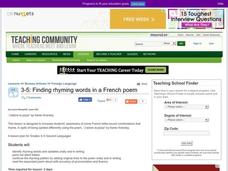Curated OER
Introduce Vocabulary: Kindergarten Count to 100 (Rogers)
Combine counting and vocabulary in context using Jacqueline Rogers' Kindergarten Count to 100. Suggested words for this text are: first, fountain, salute, second, and third. By introducing the terms before reading the text, you're...
Curated OER
Introduce Vocabulary: Mama, Do You Love Me? (Joosse)
Barbara Joosse approaches an age-old question through an equally traditional culture in her story Mama, Do You Love Me?, which helps budding readers explore Native American vocabulary in context. Here you'll find instruction to teach the...
Curated OER
Introduce Vocabulary: My Chinatown: One Year in Poems (Mak)
Beautiful illustrations and tender memories of cultural identity make Kam Mak's story My Chinatown an ideal resource for budding readers learning four vocabulary words in context: fortune, scraps, soar, and victory. Introduce these...
Curated OER
Introduce Vocabulary: Night Shift Daddy (Spinelli)
Do any of your budding readers have parents who work the night shift? Eileen Spinelli's book Night Shift Daddy, which can be found on YouTube if you don't have it, examines this family dynamic in a positive light and is an excellent...
Curated OER
Introduce Vocabulary: One Hungry Monster (O'Keefe)
Combine counting and vocabulary practice with Susan O'Keefe's engaging story One Hungry Monster, which you can find on YouTube if needed. Introduce learners to the following in-text words: doubt, gargle, rude, swear, and underneath....
Curated OER
Introduce Vocabulary: Red Riding Hood (Marshall)
It's the classic story of Little Red Riding Hood retold by James Marshall; scholars listen for six new words as you read: bouquet, charming, escort, horrid, tarry, and wicked. Introduce the words before reading so they can listen for...
Curated OER
Introduce Vocabulary: Ruby the Copycat (Rathmann)
Have your scholars ever known someone who was a copycat? Approach this issue as you study vocabulary in context by reading Peggy Rathmann's book Ruby the Copycat. Proposed focus words are: recite, murmur, plop, and coincidence. Go over...
Curated OER
Introduce Vocabulary: Ruby's Wish (Bridges)
Jump into traditional Chinese culture with budding readers as they examine vocabulary in context through Shirin Yim Bridge's book Ruby's Wish. This book is read on YouTube if you don't have it on hand. Scholars are briefly introduced to...
Curated OER
Introduce Vocabulary: Some Birthday! (Polacco)
Patricia Polacco weaves an engaging tale for budding readers in her book Some Birthday!, an excellent resource for vocabulary in context. You can use this text to introduce the following words: investigate, snarl, and squawk. After a...
Curated OER
Introduce Vocabulary: Sorting (Pluckrose)
Find guidance to introduce math vocabulary in context using Henry Pluckrose's book Sorting. This text is an excellent cross-curricular resource for budding readers. Before starting, review some new vocabulary words: collect, common,...
Curated OER
Sound Blending Lesson Plan
Mr. Snowman wants to help emerging readers understand compound words, so he segments some familiar words to help them see that they are made of two distinct words. Learners repeat the words, both segmented and blended, and observe them...
EngageNY
Using Multimedia in Presentations: Presenting Claims
Visuals help clarify claims. Scholars create visual displays to accompany their end-of-unit presentations about water sustainability. Using blank paper and their notes from the unit, they put their creativity to good use and then...
EngageNY
Qualities of a Strong Literary Essay
Put it all into words. Scholars work toward writing an argumentative essay. They begin by examining and marking strong words in Are We Medieval? A Literary Argument Essay Prompt. Learners then use Qualities of a Strong Literary Argument...
EngageNY
Forming a Research-Based Claim: Cascading Consequences Charts
Life is all about choices and consequences. Using a Cascading Consequences chart, scholars create a visual map of the effects of a particular choice or action related to water management. With their researcher's notebooks and copies of...
EngageNY
Forming a Research-Based Claim: Creating Stakeholders Charts
Present the facts. Scholars create presentations of their research on DDT using their Cascading Consequences chart and a
Stakeholders Impacts chart as visuals. They discuss the term stakeholders and create a Stakeholders Impacts chart...
Curated OER
Give It All You’ve Got Heroes and Visual Art
Sure, your young artists probably know Van Gogh and Picasso, but are they equally as familiar with Frida Kahlo and Andy Warhol? Small groups examine the work of famous artists. Then, they create their own hero portraits in Cubist style...
Curated OER
Project Playhouse
High schoolers read about Kent State's ongoing support for Hurricane Katrina victims by building and auctioning off playhouses for children. They create an ad for the playhouses, including a headline and some copy (words) plus visuals...
Curated OER
Connotation: Three Lessons for Effective Word Choice
Over the course of three days, middle schoolers explore the concept of connotation. They differentiate between the connotative and denotative meanings of sports team names, develop their own team names, logos, and text, and revise a news...
Curated OER
My Antonia: Magic Squares (Vocabulary Strategy)
Help your pupils discover the power of context clues by teaching the this vocabulary strategy. Designed to go with words from Willa Cather's My Antonia, this exercise focuses on having individuals use their own words to define new...
Curated OER
The Power of Words in "Charlotte's Web"
Students analyze the text in Charlotte's Web. In this language arts lesson, students dissect the passages from Charlotte's Web, specifically the adjectives Charlotte used to describe Wilbur. Finally, students play a game using "word...
Curated OER
Good Readers Visualize
Students explore reading. In this visualization lesson, students practice, creating images in their minds while listening to the story The Vegetables Go To Bed, by Christopher King. They listen to the story and then draw what they...
Curated OER
A Picture Is Worth a Thousand Words
Students, after reading the book, "Esperanza Rising," create a virtual display by combining different story elements into a visual representation. They choose the setting and characters of a scene that will act as a springboard of ideas...
Curated OER
Jump-Starting Research with Visual Thesaurus
Students navigate the Visual Thesaurus to find keywords for research. In this keywords lesson, students use synonyms, hypernyms and hyponyms to find keywords. Students understand why some searches are effective and some are ineffective.
Curated OER
Finding Rhyming Words in a French Poem
Explore rhyming in this phonemic awareness and French lesson. Listen to the poem "J'Adore la Pizza" by Karen Kransky and identify rhyming words. Compare grapheme spelling patterns with like phonemes, and sort word cards according to...

























